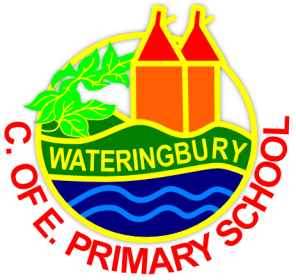Curriculum
‘I will instruct you and teach you in the way you should go; I will counsel you with my loving eye on you.’
Psalm 32:8
As you enter our school you will be met with the feeling of happiness, warmth and excitement. The children are engaged in their learning and enjoy discussing their challenges with peers and adults alike.
At Wateringbury, we obviously focus on learning, but we also have the well-being of our whole community at the centre of all we do. We are a nurturing school where everyone cares about everyone, and we are often complimented on the family feel in our school which is based on strong relationships.
Curriculum Intent
Our challenging curriculum aims to provide our children with the ability to be independent, creative, resilient and reflective learners as well as effective, enthusiastic and confident team workers.
Wateringbury CE Primary School follows the National Curriculum and places reading at its core. Establishing an early love for reading is fundamental to achievement in all subjects and our library and books are at the hub of school life. We are privileged that our school is situated in such wonderful grounds with stunning natural resources around us, such as the river and woodland. We value the environment and feel passionate about its management, and so it features heavily in our school's curriculum.
Our overall aim is to ensure that all children leave Wateringbury not only prepared for the next step in their school career but to be caring, confident and resilient students who thrive on challenge. They will embrace global issues and be well-prepared for the world beyond education.
Curriculum Implementation
The aim of our curriculum is for children to learn and to remember more; through carefully considered retrieval practices of curriculum concepts, robust planning and with an emphasis on feedback. Our children are given opportunities to take accountability for their learning by knowing how to review their own work and the work of others in a constructive way. Our children know the importance of extending and actively using a widening vocabulary.
Our children ask questions to extend and challenge their thinking and the thinking of others with confidence and adapt their ideas accordingly. They actively listen to others.
The exploration of new skills and experiences helps to nurture resilience, curiosity and creativity and a strong sense of personal development is encouraged in everyone.
How Our Curriculum is Organised
In Key Stage One (and reception) the majority of the curriculum is taught in topics, but where there are no natural links, the subjects are taught discretely. The inverse is true in Key Stage Two with most subjects being taught discretely. Where there are obvious links, units of work are organised to enable these links which support long term learning.
With all subjects and concepts, reference is made to prior learning and future learning so that children can hook new information onto well-established knowledge. High level vocabulary is defined, learnt and revisited across the year groups and across subjects.
We have a two-year rolling programme that can be used whether there are mixed-age classes in a year group or not. Programmes of study are carefully mapped so that there is appropriate progression and coverage. Progression documents map out the knowledge for each unit with disciplinary knowledge separated by year group. This means that it is easy for teachers to match the learning to the age and stage of the children in their class.
